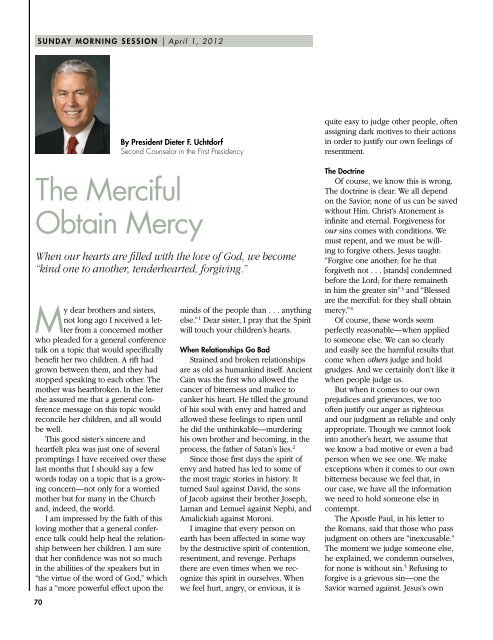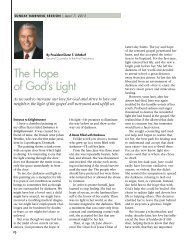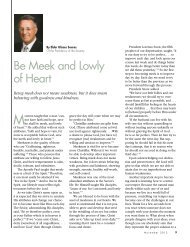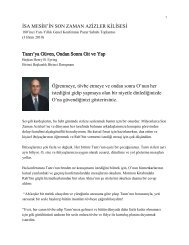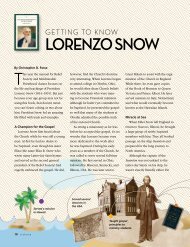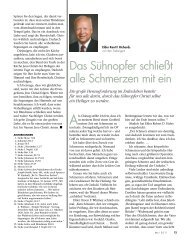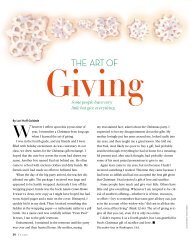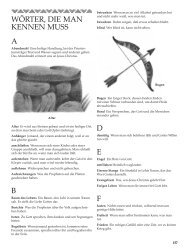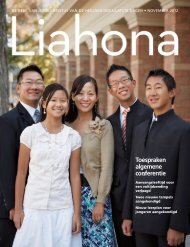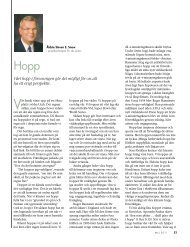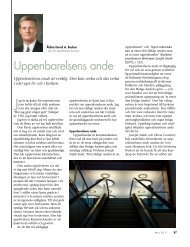May 2012 Ensign - The Church of Jesus Christ of Latter-day Saints
May 2012 Ensign - The Church of Jesus Christ of Latter-day Saints
May 2012 Ensign - The Church of Jesus Christ of Latter-day Saints
Create successful ePaper yourself
Turn your PDF publications into a flip-book with our unique Google optimized e-Paper software.
SUNDAY MORNING SESSION | April 1, <strong>2012</strong><br />
70<br />
By President Dieter F. Uchtdorf<br />
Second Counselor in the First Presidency<br />
<strong>The</strong> Merciful<br />
Obtain Mercy<br />
When our hearts are filled with the love <strong>of</strong> God, we become<br />
“kind one to another, tenderhearted, forgiving.”<br />
My dear brothers and sisters,<br />
not long ago I received a letter<br />
from a concerned mother<br />
who pleaded for a general conference<br />
talk on a topic that would specifically<br />
benefit her two children. A rift had<br />
grown between them, and they had<br />
stopped speaking to each other. <strong>The</strong><br />
mother was heartbroken. In the letter<br />
she assured me that a general conference<br />
message on this topic would<br />
reconcile her children, and all would<br />
be well.<br />
This good sister’s sincere and<br />
heartfelt plea was just one <strong>of</strong> several<br />
promptings I have received over these<br />
last months that I should say a few<br />
words to<strong>day</strong> on a topic that is a growing<br />
concern—not only for a worried<br />
mother but for many in the <strong>Church</strong><br />
and, indeed, the world.<br />
I am impressed by the faith <strong>of</strong> this<br />
loving mother that a general conference<br />
talk could help heal the relationship<br />
between her children. I am sure<br />
that her confidence was not so much<br />
in the abilities <strong>of</strong> the speakers but in<br />
“the virtue <strong>of</strong> the word <strong>of</strong> God,” which<br />
has a “more powerful effect upon the<br />
minds <strong>of</strong> the people than . . . anything<br />
else.” 1 Dear sister, I pray that the Spirit<br />
will touch your children’s hearts.<br />
When Relationships Go Bad<br />
Strained and broken relationships<br />
are as old as humankind itself. Ancient<br />
Cain was the first who allowed the<br />
cancer <strong>of</strong> bitterness and malice to<br />
canker his heart. He tilled the ground<br />
<strong>of</strong> his soul with envy and hatred and<br />
allowed these feelings to ripen until<br />
he did the unthinkable—murdering<br />
his own brother and becoming, in the<br />
process, the father <strong>of</strong> Satan’s lies. 2<br />
Since those first <strong>day</strong>s the spirit <strong>of</strong><br />
envy and hatred has led to some <strong>of</strong><br />
the most tragic stories in history. It<br />
turned Saul against David, the sons<br />
<strong>of</strong> Jacob against their brother Joseph,<br />
Laman and Lemuel against Nephi, and<br />
Amalickiah against Moroni.<br />
I imagine that every person on<br />
earth has been affected in some way<br />
by the destructive spirit <strong>of</strong> contention,<br />
resentment, and revenge. Perhaps<br />
there are even times when we recognize<br />
this spirit in ourselves. When<br />
we feel hurt, angry, or envious, it is<br />
quite easy to judge other people, <strong>of</strong>ten<br />
assigning dark motives to their actions<br />
in order to justify our own feelings <strong>of</strong><br />
resentment.<br />
<strong>The</strong> Doctrine<br />
Of course, we know this is wrong.<br />
<strong>The</strong> doctrine is clear. We all depend<br />
on the Savior; none <strong>of</strong> us can be saved<br />
without Him. <strong>Christ</strong>’s Atonement is<br />
infinite and eternal. Forgiveness for<br />
our sins comes with conditions. We<br />
must repent, and we must be willing<br />
to forgive others. <strong>Jesus</strong> taught:<br />
“Forgive one another; for he that<br />
forgiveth not . . . [stands] condemned<br />
before the Lord; for there remaineth<br />
in him the greater sin” 3 and “Blessed<br />
are the merciful: for they shall obtain<br />
mercy.” 4<br />
Of course, these words seem<br />
perfectly reasonable—when applied<br />
to someone else. We can so clearly<br />
and easily see the harmful results that<br />
come when others judge and hold<br />
grudges. And we certainly don’t like it<br />
when people judge us.<br />
But when it comes to our own<br />
prejudices and grievances, we too<br />
<strong>of</strong>ten justify our anger as righteous<br />
and our judgment as reliable and only<br />
appropriate. Though we cannot look<br />
into another’s heart, we assume that<br />
we know a bad motive or even a bad<br />
person when we see one. We make<br />
exceptions when it comes to our own<br />
bitterness because we feel that, in<br />
our case, we have all the information<br />
we need to hold someone else in<br />
contempt.<br />
<strong>The</strong> Apostle Paul, in his letter to<br />
the Romans, said that those who pass<br />
judgment on others are “inexcusable.”<br />
<strong>The</strong> moment we judge someone else,<br />
he explained, we condemn ourselves,<br />
for none is without sin. 5 Refusing to<br />
forgive is a grievous sin—one the<br />
Savior warned against. <strong>Jesus</strong>’s own


